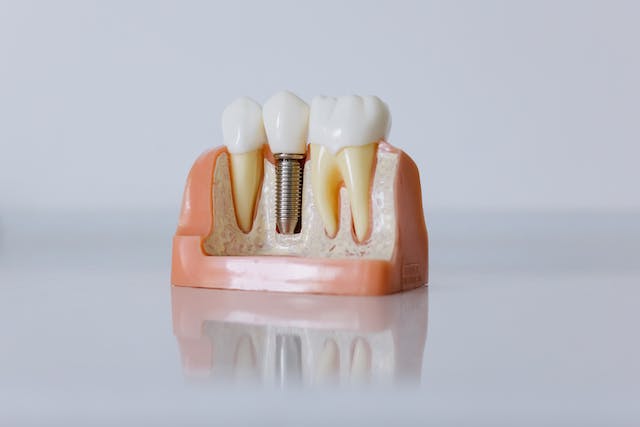Has your dentist informed you that you need dental implants?
There is a number of reasons why a dentist might recommend teeth implants. For example, if a patient is experiencing difficulty or discomfort chewing or eating, they can be used to replace a single tooth or multiple teeth. Aside from this, they can rectify the appearance of gapped teeth – giving patients a beautiful smile and oodles of confidence – enhance oral health, and improve speech.
Whilst teeth implants have a 95% success rate, it’s not to say that problems don’t arise. Some issues are short-lived and can be prevented by patients, but many develop as a consequence of poor procedural planning.
Here we take a look at potential dental implant problems and offer a simple solution to avoid them. And for expert dental care, visit Dental Glendale.
3 common teeth implant problems
1. Infection and poor healing
By applying their knowledge, and following all the sterile techniques, your dentist will ensure that the risk of infection is kept to an absolute minimum. However, our mouths are full of bacteria which means infections can develop at any time.
Swelling, mild pain and discomfort are to be expected within 1-4 days after the dental implant procedure. But if the problem persists, there could be something wrong and you should consult your dentist as soon as possible. If you need a recommendation, don’t hesitate to fix that toothache with the dentist in little falls.
For the most part, infections and poor healing are caused by patients not sticking to the post-surgery instructions. However, it’s not uncommon for an infection to develop several months later as a result of an underlying issue not being detected before the procedure.
2. Micromovement
Teeth implants must be held in place in the first few weeks to allow for osseointegration. This is the process of connecting human bone with an artificial implant – creating a permanent affinity and ensuring long-lasting results. Any slight movement can hinder the process and make implants wobbly.
The truth is, during the initial 8-12 weeks, the implant is at risk of not growing into the bone and soft-tissue ingrowth occurs instead. When this happens, it’s very painful and, to rectify the issue, you might need to undergo surgery yet again.
To eliminate micromovement of the dental implant, make sure you follow your dentist’s dietary recommendations. You’ll likely be required to drink plenty of fluids as opposed to solid foods that could dislodge the implant.
3. Lack of bone
It’s no secret that a successful dental implant is one that fuses with the bone on all sides. And, although the jaw readily accepts implants, the success of the procedure depends on the strength of your jawbone. This is because, over time, the bone can wear down and decay, meaning it’s weaker to affix the implant.
If this is the case, your dentist might need to perform an additional procedure, like a bone graft, to increase the bone volume and allow for the placement of teeth implants.
How can you avoid dental implant problems?
Rule number one is to make sure that your dentist specialises in dental implants, and don’t be afraid to ask what the practice’s success rate is. You want to trust that you’re in the safest of hands when having teeth implants and that the surgeon has experience in abundance. And that is exactly what you can expect from EvoDental.
They are a team of clinicians, engineers and scientists who are experts at what they do. They appreciate that everyone’s mouth is different and offer a tailored solution to suit each patient. You can relax knowing that they are 100% dedicated to full jaw dental implant solutions and use only the best techniques and technology for their procedures.
So, to ensure your teeth implants are problem-free, get in touch with the professionals and book a consultation today.

